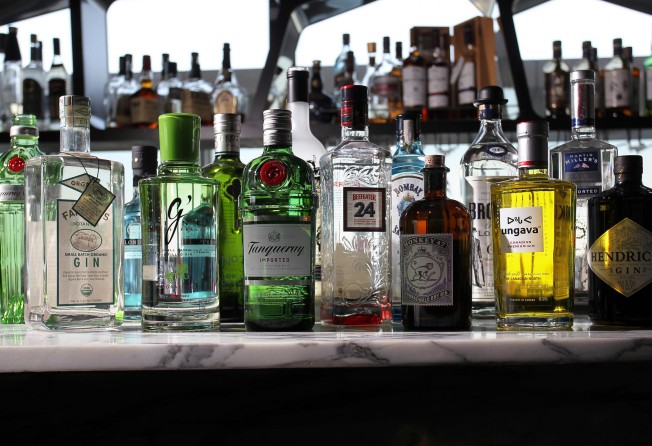
Gin is back in demand at bars in Hong Kong and beyond
The formerly old-fashioned spirit becomes trendy with a new generation of drinkers, with modern twists such as flavour infusions and creative cocktails


There used to be a curious visual prejudice when it came to alcohol. Whiskies and brandies, rich and lusty in their swirling amber hues, were the tipples of choice for many, while wines in ruby red or liquid gold were popular everyday drinks - leaving white spirits such as gin to literally pale in comparison.
Not that we need any encouragement to add another spirit to our liquid arsenal, but gin - previously banished to the dusty shelves of past generations - has experienced a refreshing revival in recent years. Its exploding popularity has led to an increasing number of bars dedicated to the spirit, and to impressive flavour infusions and the creation of more nuanced varieties of tonic, known as gin's best friend.
"In many ways, this is the most exciting time in history for gin and gin drinkers," says Erik Holzherr, who goes by the moniker "The Gintender" and owns three bars in Washington DC. "I have been into gin as long as I can remember, and we stock more than 90 different brands. But it wasn't until the last two years that I've noticed an increased excitement and demand for the spirit."

He attributes this to the booming cocktail culture and to the emergence of a new generation of drinkers. "[These] newer, young drinkers are embracing change and doing what many generations tend to do - [which is] everything possible to avoid their parents' style and culture, which includes their negative views of gin," he says. "In some ways, this gin resurgence is a rebellion of values and style."
This phenomenon has certainly not been confined to Western shores. Hong Kong-based mixologist Antonio Lai, the owner and consultant of Quinary and Origin - the latter of which is one of the top gin bars in the city - says local demand for the spirit was only a couple of years behind Europe, and that curiosity was the most significant element behind it.
"More of our customers, who were familiar with gin and tonics, became very curious about the ingredients and different styles of gins, and some of them started trying gin on the rocks and eventually just a small cube of ice or a dash of tonic," he says. "But some of the time, we found that just introducing the spirit to non-gin drinkers was fairly difficult. To ease them in, we made some creative cocktails to entice the beginners."
Lai is a firm believer in pushing the limits, and as of the end of last year, Origin was still the only bar in Hong Kong with its own gin still. Origin has more than a dozen in-house blends - the result of Lai's never-ending experiments in which he redistills gins with a variety of ingredients ranging from pandan leaf, shiso leaf and lemongrass to basil, lemon peel and cucumber.


"Not all combinations work," he says. Lychee, a popular ingredient in local drinks and cocktails, was a disaster, as was banana. "The flavours fought together and didn't produce a good end result."

The endless combinations of flavours have proven to be instrumental in building a growing population of gin aficionados. The spirit differs greatly from vodka in that vodka disappears into a cocktail while gin accentuates it, says Holzherr, who claims it's his "personal mission to convert vodka drinkers to gin drinkers".
The distinct character of gin is something that Teresa Moon is familiar with. The mixologist and assistant manager at Ozone, The Ritz-Carlton Hong Kong's 118th-floor bar, grew up in Spain, where gin is a popular drink of choice. She has made a careful study of the different characteristics of the spirit, and one of her recent cocktail creations, 24 Reasons, was awarded second runner-up at the Beefeater 24 Global Bartender Competition last year.
"It could be a hot summer's day, for example, and I would crave a cocktail made with G'Vine, a flowery, fresh gin, whereas on a bitterly cold night I might want a martini made with a strong, hearty gin like Monkey 47, which would certainly warm me up," she says. "People are describing gins with as much depth as they do with whiskies, and they're starting to differentiate between tonics as well."
She points out how as people grow increasingly attuned to the subtle nuances of gin, they're also paying more attention to what tonics should be paired with the spirit. Ozone, for example, has a menu for tonic waters, with varieties from Britain, the US and Japan, and an in-house blend. The descriptions read like wine-tasting notes: "herbal and aromatic", "sharp and clean", "delicate and soft".

The pairing of ingredients with premium gins is a subtle skill, so there is such a thing as going overboard. "When I find a gin that impresses me, I try not to doctor it up or alter it too much," Holzherr says. "I believe a good cocktail allows you to taste the individual ingredients used rather than masking those pieces of the puzzle."
Moon is of the same ethos, and references her background as a strong influence.
"Having come from a culinary background before I started with mixology, I think that if you have a premium ingredient, everything that goes with it should showcase it and not hide it. This follows the Mediterranean philosophy as well, of respecting the ingredient," she says.
Whichever way you look at it, there's no doubt that something special is happening to the world of gin right now, so the next time you're out it may be worth it to dip a toe in the juniper berry pool and find out if there's a variety of the spirit that's right for you. As Moon puts it: "There's a different gin for every moment."
